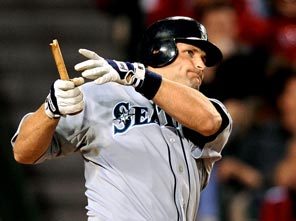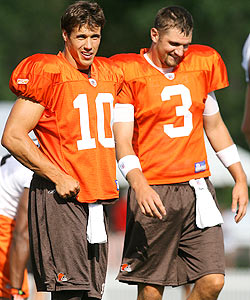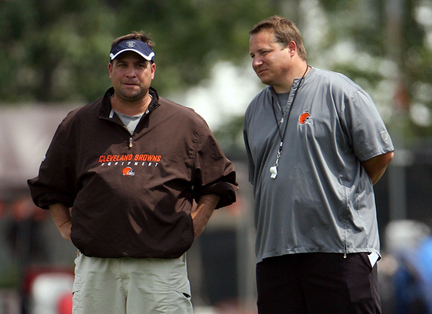 General
General  General Archive
General Archive  Lingering Items--Quantitative Analysis Edition
Lingering Items--Quantitative Analysis Edition
 In the infamous words of Alex Baldwin in “State and Main”, well, that happened.
In the infamous words of Alex Baldwin in “State and Main”, well, that happened.
The Cleveland Indians signed Russell Branyan, against all sense and logic and this is what qualifies as good news in Cleveland. Back problem, schmack problem. If he can just somehow repeat his career year (and I’ll disregard the inherent oxymoronic nature of that phrase) then the Indians have a chance to, what, win 73 games instead of 71?
Branyan is an awful player living off a singular ability to hit long home runs on occasion. As a player, he’s less dimensional than even Mel Hall. I could spend the next several paragraphs providing the iron clad case against Branyan but at this juncture what’s the point? Indians-President-In-Waiting Mark Shapiro already struck the deal.
Here’s the issue with the Indians as I see it. They operate in an economically-depressed market in an ethically-challenged league led by a thin-skinned commissioner with the business sense of a Russian peasant. They are owned by folks committed to conflicting goals of winning a World Series while maintaining a modest payroll. To accomplish these goals the only competitive advantage they can muster is to find off-the-radar players through their use of quantitative analysis about any and every professional and amateur player in the universe. The problem is that irrespective of what that analysis tells them, they still end up with players like Branyan.
I’ll challenge Shapiro and General Manager-In-Waiting Chris Antonetti to make the statistical case for Branyan. Go ahead, I’ll wait. The truth is, they can’t. Sure, you can highlight some things, downplay others and come up with a scenario that paying Branyan $2 million for the numbers he projects is a relatively low risk proposition in the context of the bizarre economics of baseball.
But Branyan is simply a baseball vagabond, nothing more. He’ll drift from city to city year after year and won’t take root anywhere. He’s not good enough to invest in long-term and apparently isn’t awful enough to move on to his real life’s work.
What good, though, is the Indians’ so-called competitive advantage, its front office smarts, if they are put to this kind of use? Maybe Branyan’s name was spit out by some hybrid program Antonetti cobbled together, but if he is the end result then it may be time to develop a new program.
There is just something about all of this that I find terribly depressing. For the last two seasons the Indians have been dumping nearly every asset of value as if the Dolans were trying to re-enact the movie Major League. In doing so they’ve stripped the fans of any real semblance of hope and replaced it with a lingering sense of dread.
But every year is a new year and no sport regenerates faint feelings of hope more than baseball. And yet the Indians are barely in camp and they’re already dropping turds in the punchbowl, saying, basically, Branyan is the best that we can do.
This season and the next several are now officially being played for the baseball purists, that rare breed of person that loves the poetry of the game and would be just as content to watch the Washington Nationals play the Kansas City Royals as they would be to watch the Indians play anyone.
For them and maybe a few others, watching some young players get good enough where they'll be too pricey to sign long-term is about all that's on the horizon to keep them satisfied. Meanwhile the more meaningful games will be played elsewhere once more.
**
 The NFL combine is open for business which means, of course, that the NFL’s official Disinformation Campaign is in full swing. The combine has morphed into a traveling circus, except that it sticks around longer and is even less entertaining.
The NFL combine is open for business which means, of course, that the NFL’s official Disinformation Campaign is in full swing. The combine has morphed into a traveling circus, except that it sticks around longer and is even less entertaining.
Teams approach it like an amateur approaches a no-limit Texas Hold’em tournament in Vegas, as if the point of it all isn't to win but to bluff well. So scared are teams of tipping their hand about what they plan in both free agency and the draft that instead of really using it for its intended purpose it's now just about showing how uninterested you really are in the guys that interest you most.
I’ll make this easy for any fan who is trying to glean insight about the Browns’ plans from what’s taking place at the combine. Turn off your television set. Hide your morning Plain Dealer (if you still subscribe to it, which you probably don’t). Ignore WKNR (which you’re probably doing already). Nothing that takes place at the combine has any relevance to who the Browns might sign or draft. It’s really that simple.
If you don’t believe me and instead want to follow the arc of the various Tony Grossi musings on this subject, then drop me a line in another week or so and let me know how accurate the following is: the Browns are interested in a quarterback, or they aren’t. Maybe they really want a right tackle to bookend with Joe Thomas on the left. They like Sam Bradford if he’s not hurt. Same goes for Colt McCoy. Jimmy Clausen reminds them too much of Brady Quinn or maybe he doesn’t. The Browns are going to trade down or else trade up. They will package some of the draft picks they go last year for even more next year or else they’ll concentrate on the defense.
There you have it. Your update from the combine. Plan accordingly.
**
 I continue to remain puzzled as to exactly why general manager Mike Holmgren retained head coach Eric Mangini. Most of what Holmgren's said lately, particularly as it concerns Derek Anderson and Brady Quinn is a flat-out repudiation of how Mangini ran the team last season.
I continue to remain puzzled as to exactly why general manager Mike Holmgren retained head coach Eric Mangini. Most of what Holmgren's said lately, particularly as it concerns Derek Anderson and Brady Quinn is a flat-out repudiation of how Mangini ran the team last season.
From nearly the day he arrived on campus last season, Mangini set up an ill-conceived quarterback competition. He never affirmatively settled on either and as a result made both unprepared and tentative.
From nearly the day he arrived on campus, Holmgren has intimated how ridiculous the whole situation really became. Speaking to reporters at the combine, Holmgren couldn't have been more dismissive of Mangini's handling of the situation. As reported in the Akron Beacon Journal, Holmgren said “whoever's playing has to believe you have his back. That confidence level, even though you make a mistake, 'I'm still OK. I'm going to get better.' He's got to feel that. It's all part of coaching that position.” Ouch.
But there was more. “Someone's got to play a full season, not two games here, off two games, three games, off two, that doesn't work. Because whoever's playing, the first interception, everybody in the stands yells for the other guy. And then you switch them. It doesn't work. So pick one, commit, coach them up, build confidence, make them better and go. And surround them with good people.”
That's about as opposite of an approach as one can get to how Mangini handled the situation last year. Much of what Mangini does, actually, is to prey on a player's insecurities as a means of motivating him, as in “if you don't want me to keep yanking you out of there, don't throw an interception."
It sounds, though, that Holmgren is going to make it easier on Mangini. Rather than leave him with the decision on who to start, Holmgren has removed Mangini completely from the process and put it in his own hands and those of general manager Tom Heckert.
In a more subtle way, Holmgren and Heckert also have repudiated Mangini by indicating that they tend to make a tender offer to running back Jerome Harrison. On the surface that may seem like an easy decision given what Harrison accomplished at the end of last season. But just remember that Mangini almost steadfastly refused to give Harrison an opportunity at all until he was forced to because of injuries. Mangini was more infatuated with the rookies he brought in and with Jamal Lewis, even though Lewis clearly was washed up. Even when Harrison would excel in spot duty, as he did in the first Cincinnati game last season, he found himself buried the next week.
It's a nice outcome for Harrison, a back that former head Romeo Crennel also didn't treat particularly fairly. As for Mangini, it's once again a reaffirmation that his input into personnel decisions will be limited at best.
**
 I actually believe Holmgren when he says that he hasn’t made a decision yet on whether to keep or jettison Anderson and Quinn. I also think that this is the lynchpin decision for the Browns. If you really want a clue into their thinking, the next key date on the calendar is March 19. That’s when Anderson is owed his next roster bonus, a tidy $2 million.
I actually believe Holmgren when he says that he hasn’t made a decision yet on whether to keep or jettison Anderson and Quinn. I also think that this is the lynchpin decision for the Browns. If you really want a clue into their thinking, the next key date on the calendar is March 19. That’s when Anderson is owed his next roster bonus, a tidy $2 million.
Former general manager Phil Savage has been bashed by many, including me, for a whole laundry list of sins. But his handling of Anderson and his contract situation isn’t one of them. Anderson had the good fortune of having a breakout, Pro Bowl season during a free agent year. Even with Quinn lurking in the background, Savage was able to sign Anderson to a very club friendly contract that has had all sorts of convenient off-ramps attached to it. March 19th is just the latest.
For a team still building (you can’t rebuild something that wasn’t ever built right in the first place), it helps when you aren’t saddled with the previous regime’s baggage. Savage may not have been able to foresee his own demise but he was at least able to foresee the likely scenarios involving Anderson and Quinn and plan accordingly.
In much the same way as he did with Anderson, Savage also signed Donte Stallworth to a club friendly contract. Stallworth proved himself the worst free agent signing in history in his first season and yet head coach Eric Mangini still pulled the trigger on him for a second season, only to see that blow up in his face the very next day.
There are two points to all of this. First, it’s so much more myth than reality that Savage left the franchise a mess. Savage had a spotty history in the draft and left this team without much talent, but from a business perspective, the team was not being run like the Scranton branch of Dunder-Mifflin as Mangini implied all last season. Second, because the franchise is not the mess that Mangini liked to say it was, it is actually well positioned to build in earnest and in the right way far more quickly than most realize. Having, finally, a credible head of the organization was all that was needed and now that box has been checked.
**  Speaking of cleaning up the last few dirty dishes, the other news of the week from Browns camp is that, surprise surprise, the Browns and former general manager George Kokinis have settled their differences.
Speaking of cleaning up the last few dirty dishes, the other news of the week from Browns camp is that, surprise surprise, the Browns and former general manager George Kokinis have settled their differences.
There was no way this wasn’t going to get settled. Terms are confidential, of course, but just know that Lerner is parting once again with a boatload of money for another former executive. Call it the high cost of his own mismanagement.
The only thing that bothers me about all of this is the whisper campaign that’s been going on about Kokinis. According to reports he was overwhelmed from day one, came into work late, left early and occasionally would nap at his desk like George Kostanza.
I don’t know whether any of this was true but it’s hard to imagine they are given how little time Kokinis was on the job. But let’s assume it is true. What does that say about Mangini, the person who handpicked his own boss? The kinds of things being said about Kokinis are major red flags. How could Mangini have missed them?
I rather doubt he did miss them. I just consider the vested interest of those spreading those rumors and place them into that context, just I place it into context that Mangini has a distinct patter of burying former close friends when it furthers his own interests.
Putting all that aside, though, this was a distraction that’s now been resolved, allowing the Browns to truly look forward. It’s about time.
**
Here's a question that keeps me pondering as I read more and more about the upcoming NFL draft: why is Jimmy Clausen considered a first round pick?
- NBA Announces 2013-2014 Schedule
- Browns Ink Sharknado
- Sharknado A No-Show For Rookie Camp
- Trent Richardson Out Until Training Camp
- Browns Sign Brandon Jackson
- Carrasco Suspended Eight Games
- Browns Add to Wide Receiver Depth with David Nelson
- Browns Need to Learn from Past Draft Mistakes
- Browns Release Chris Gocong and Usama Young
- Browns Missing on Grimes Disappointing, But Not The End
The TCF Forums
- Movies coming out
rebelwithoutaclue (Tuesday, January 21 2014 12:56 PM) - 2015 Recruiting
jclvd_23 (Tuesday, January 21 2014 12:38 PM) - The 2014 Offseason Thread
Larvell Blanks (Tuesday, January 21 2014 12:25 PM) - Official- Browns Coach Search/Rumors
Larvell Blanks (Tuesday, January 21 2014 11:53 AM) - Chris Grant's first 3 drafts
Kingpin74 (Tuesday, January 21 2014 10:13 AM) - Mike Brown
YahooFanChicago (Monday, January 20 2014 11:15 PM) - 2014 Hoops Hockey Hijinx
jpd1224 (Monday, January 20 2014 4:44 PM) - 2014 Recruiting
jclvd_23 (Monday, January 20 2014 2:26 PM) - Wish List - #4 Pick
Hikohadon (Monday, January 20 2014 1:26 PM) - #1 overall pick Anthony Bennett
TouchEmAllTime (Sunday, January 19 2014 1:28 PM)


